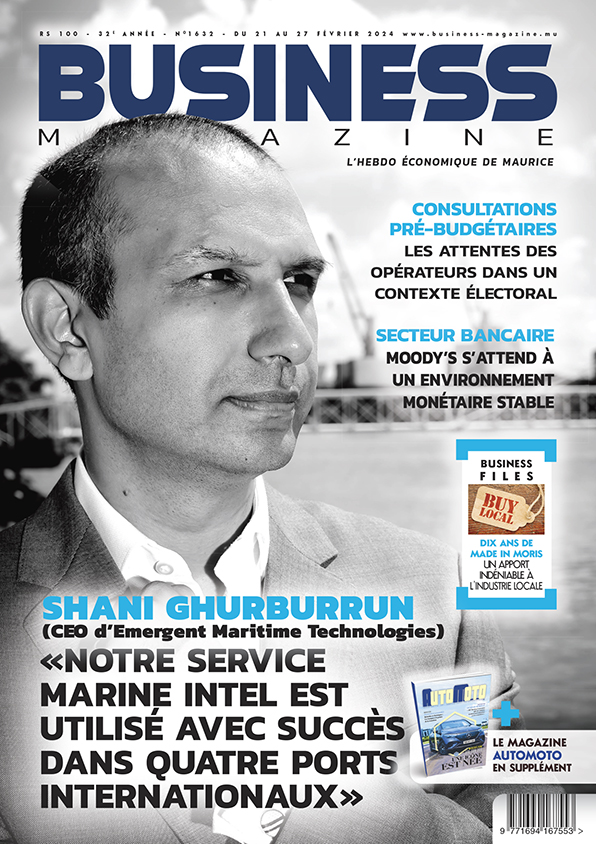Paul Baker : Challenges ahead for the Mauritian economy
Share

The world economy can expect an interesting year ahead, possibly even a couple of years of uncertainty. Brexit and its outcome, the election of Donald Trump as President of the United States of America, and the totally unforeseeable result of the future elections in Europe, will mark a departure from “business as usual”. Accompanying this, though with less pomp and uncertainty, is the slowdown in Southeast Asia, which will affect demand for African commodities and natural resources, which fuelled the continent’s growth in the recent past. The world is inextricably linked and Mauritius, an extremely open economy, is vulnerable to contagion.
Mauritius has already faced the initial after-shocks of the Brexit vote, through a significant depreciation of the pound sterling, which affected a number of sectors, such as tourism and sugar, as their annual contracts are denominated in pounds: this meant a real drop of 18% in the value of the contracts, in the pound’s lowest moment.
The road ahead of Brexit does not seem very promising. The European Union and the United Kingdom are very likely to consume the two years of negotiations without reaching a mutually agreed outcome. Without the willingness to extend negotiations, Brexit would represent a tough divorce between the EU and the UK. This hard breakup would be characterised by a lack of legal framework governing the future EU-UK relationship. What does this mean for Mauritius? Currently, EU-Mauritius trade (including with the UK) is regulated by a free trade agreement, the interim Economic Partnership Agreement (iEPA). With Brexit, the UK would no longer be part of this agreement, and, therefore, future trade between Mauritius and the UK would face considerable uncertainty of whether it faced tariffs or new non-tariff barriers. Our analysis indicates that while Brexit will affect exports directly through any changes in trading arrangements, however it is the change in purchasing power (and loss of confidence) in both the EU and the UK that could seriously undermine some Mauritian economic sectors.
Donald Trump’s presidency will also represent a wave of uncertainty for both the international economic and diplomatic scenes. Whilst many analysts believed that President Trump would not adopt many, if any, of his more radical stances, after he was sworn in as President in January 2017, those were precisely among his earliest Executive Orders. Additionally, his policy stance is decidedly protectionist, as proved by his early decision to withdraw the United States from the Trans-Pacific Partnership. Following this path, there seems to be little chance that the United States will conclude the Transatlantic Trade and Investment Partnership (TTIP) – the EU-US trade agreement currently under negotiation. Trump has expressed his desire to renegotiate the terms of the North American Free Trade Area, on the expectation of hiking up tariffs and making outward investment less fluid. On Africa, he also spoke against the existing US programme granting unilateral tariff preferences to African countries, the African Growth and Opportunity Act (AGOA), from which the Mauritian textile producers are major beneficiaries.
The political situation in Europe is not optimistic either. With the rise of nationalism in several European countries, an anti-EU sentiment seems to have spread across the European political scene. With candidates in France and the Netherlands aiming to follow the example of Brexit and renounce to the Union’s membership, the EU is under serious threat. The Netherlands has threatened to leave the eurozone, which would plunge the euro into a turmoil, while France’s far right would seek a UK type of arrangement. All these uncertainties put both the Union and the common currency under serious stress, seriously affecting, not only the EU member states, but also all its commercial partners, such as Mauritius, which relies on the EU for over 40% of all its exported products.
Nevertheless, opportunities might also arise from 2017 and following years. On Brexit, a quick response from Mauritius and its African partners, by signing a trade agreement with the UK once the UK has formally left the EU, could mitigate some of the negative impacts, and even allow Mauritian companies to take advantage from the situation, due to the European loss of market access.
To counter possible disruptions arising from President Trump’s protectionist decisions, such as the derogation of AGOA, countries in Africa should consider taking advantage of Trump’s preference for bilateral trade agreements by exploring the possibility of negotiating a trade and investment agreement with the US. Trump’s expansionary fiscal policy will drive up the value of the dollar and spur a consumption frenzy in the US. This will be good in the short term but will likely lead to misalignments of the real and monetary economies over the longer term (we can expect another harsh bust cycle towards the end of his presidency – unless Trump’s presidency manages to postpone the hangover from exuberant markets for another election term).
Against the wave of economic protectionism that seems to be sweeping across the world, there are some critical trends aiming to liberalize and facilitate trade across countries. One remarkable achievement in this sense has been the recent entry into force (on 22 February 2017) of the Trade Facilitation Agreement, an agreement negotiated at the World Trade Organisation and ratified by 112 countries, which is meant to streamline, simplify and standardise customs procedures, therefore cutting trade costs around the world and helping developing countries, such as Mauritius, who is party to the agreement, to increase their export basket and diversify trading partners. In a surprising move, China has spoken against protectionism during the World Economic Forum in January this year, and favours multilateralism rather than regionalism, making it a more open market for all.
Africa is also meant to reach a significant landmark this year. Whilst the continent is known for its high import duties and imposing layers of restrictions on trade, the African Union is meant to finalise negotiations over a continental free trade area (CFTA) by the end of 2017, as the basis for a future and wider economic, monetary, and parliamentary union. In line with its Africa Strategy, Mauritius is taking part in the negotiations, which will – once ratified and implemented – liberalise trade across all African countries, and present tremendous opportunities for Mauritius to position itself as an investment hub.
To conclude, in 2017, Mauritius will likely continue to face inflation, maintain its trade in goods deficit and is expected to also face some fiscal indiscretions to boost the economy and undertake the large infrastructure projects it envisions. This will put pressure on borrowing requirements, as well as interest rates, which may slow down investment in productive sectors, which already remains low. Initiatives such as the SME schemes (financial and otherwise) will be ever more important as flanking measures to not only address domestic imbalances but help small and medium enterprises adjust to the series of shocks we expect to happen globally.









